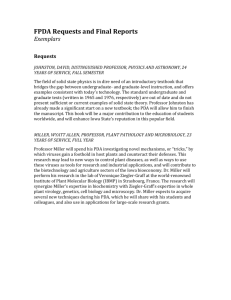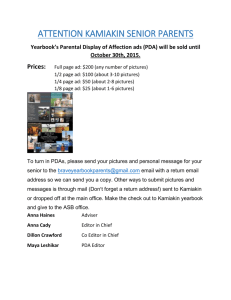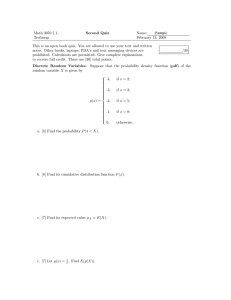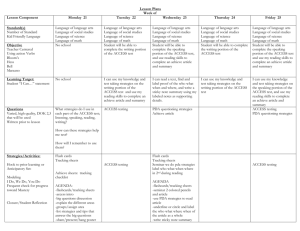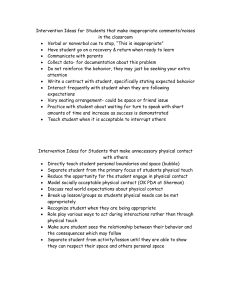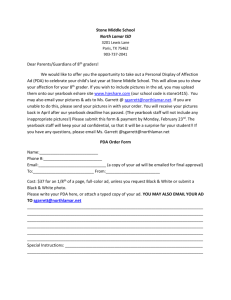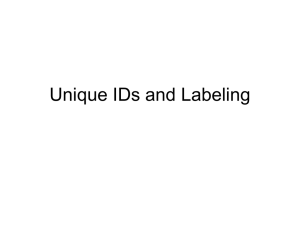Ruggedized Handheld Computers in Biological Research Jeffrey Muday
advertisement
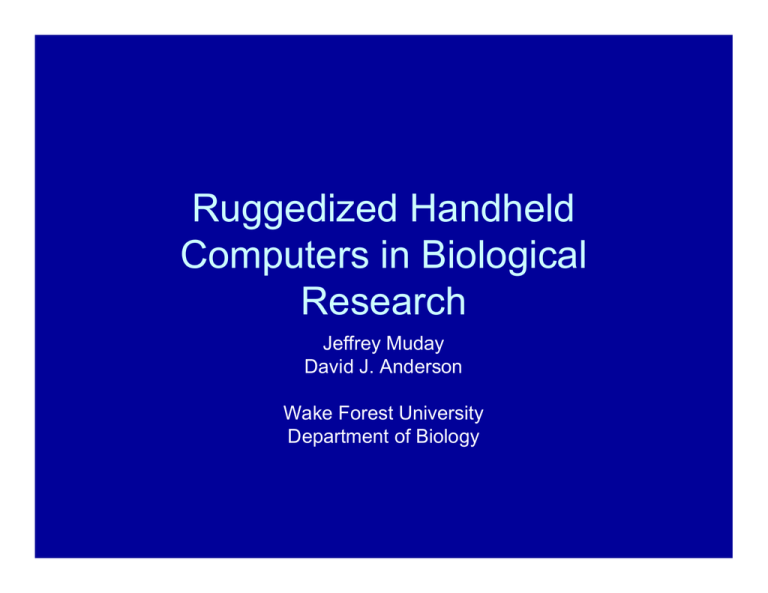
Ruggedized Handheld Computers in Biological Research Jeffrey Muday David J. Anderson Wake Forest University Department of Biology Why PDA / Handhelds? • Automation of repetitive observational tasks – Replacement of paper log notebooks? – Increase accuracy of reporting tasks – Reduce translational errors from traditional paper journals to various electronic forms – Save time • Innovative research tools – Handheld (PDA) computing form factor has many advantages • Easier travel (customs) • Small size / low weight – Integration of digital data from various pieces of technology (immersion monitors, PDA, GPS) centered on laptop as analysis/reporting tool – Integration of “interesting” peripherals • Barcode scanning, GPS loggers, other data collection devices Symbol 2700 in the Galapagos Mark Westbrock Jeff’s Goals • Production of a “General Purpose” PDA Database/Logging Program for use in classroom and or research scenarios • Partnership with ISSC R&D Group expertise/resources to specific research domain issues • Development of domain specific tools as “Proof of Concept” • Maybe? Expand University’s Expertise in innovative/novel technology and applications PDA Use History • PDA first suggested by D Anderson in 1997 as a way of automating and standardizing logs • WinCE platform suggested by a Computer Science undergraduate, Chris Marts • Investigation of PalmOS vs WinCE (1998) • First PDA census program 1998-99 – Everex Freestyle-66 MHz processor and 8 MB of RAM • PDA proved difficult to interface to satellite phones—needed a laptop in the field Problems with Developing for PDA • • • • • • Small memory No true mass storage options Lack of non-volatile storage Battery life issues Small screen size Transfer of data from PDA to other platforms can be challenging • WinCE/PocketPC stripped of some very useful classes (programmer’s problem) Advantages of PDA • Small size – Convenient, portable – Unobtrusive – Can be worn on body • Low power consumption – (especially the Symbol 2700) • High availability • Durability • Pen/Touchscreen interface Census / Birdtrack • Albatross Census; (1998-present) – – – – – – – Based on WinCE 2.0 VC++ platform Everex Freestyle/Casiopeia E11 handheld Observer log in Band number typed on keypad Lookup on limited database of existing birds New data logged about a particular bird Many iterations/variants have been used • Foot damage, blood samples, sex confirmation, last seen Screen Shots: The Census Program Emphasis on Speed and Simplicity Bird Carried GPS Logger • GPS movement downloader (2002) – Downloads data from a bird GPS “backpack” – Can also be used to download data from bird “Immersion Monitors” – Supports simple serial (RS-232) standard download with hardware handshaking Behavior Logging • Nest Logger I; (2000-2002) – Logging of time and actions by a particular nest/family group – Simple, fixed pushbutton interface – Logging to plain-text date-based files – The basis for a new “generic” Ethogram program currently in writing stages for Wm. Conner Elaine Porter using B-Logger B-Logger • B-LOGGER I and II; (2002-2003) – Based on Symbol Systems PDA platform (thanks to technical and financial support from J. Dominick, A. Bishop, and P. Escott) – Map-based Behavior logger (thanks C. Fulp for advice/support on graphics) – Screen gesture selects a location on a map accurate to 0.5m or less, judged by accurate listings of hundreds of nest sites. – Band numbers entered via keypad or laser barcode reader (thanks to M. Johnson and R. McCartney) – Excellent confidence going into the field because of battery life/duty cycle research performed by MJ and RM. – Subsequent release II in 2003 (for E Porter) supports larger maps and better accuracy, variable screen origin, and zoomin/zoom-out capability. Classroom EthoLog Ethogram logger concept, Bill Conner – Allows user to log behavioral events from a list of choices – Allows user to optionally identify the “actor(s)” – Allows user to add new behaviors to the predefined list of behavioral events – Proof of concept established by Anderson’s Nest Logger program – Protoype was successfully piloted summer session II by WFU students A Sample Ethogram Ethogram Button Wizard Developed by Michael Swofford Results • Confidence: – PDAs are rugged enough for field use – battery life sufficient for frequent field activation of Barcode scans – Flexible enough for Domain specific application • Time saved: – Massive amounts of time saved by having logs in electronic form – Standardization of logging formats – Frequent repetitive reliable observations now possible • Improved Accuracy Valuable Code Re-use • • • • • • Keypad Barcode Map Resource/INI file Log file Serial communication Remaining Goals • Integration of GPS – To supply accurate Time, Date, Lat, Long, Elevation coords. – As context source for Map object • Development of “Wizards” to customize Ethogram program suite – Valuable concept for any Database tool • Development of a Biological/Archeological collection tool (application: Botanical/Herbarium) • Generic database/logger idea? – Is a useful implementation possible or is the PDA too “brittle” of a platform? Future Directions • Wireless networks – Enhancement of communication – Client/Server model – “Uplink” of field data • GPS awareness – positional context sensitive database – Ability to use PDA as a mapping device • Tablet form-factor computing – PDA is too small for some aspects of computing – Integration with newer communication standards Client/Server Computing Problem: Databases will contain too much data to be hosted on handheld computers. Solution: Bring a database server to the field and have PDAs function as clients. Requirements • Headless – requires no monitor keyboard or mouse. • Network – wireless 802.11x + Cat 5 Ethernet • Removable solid-state mass storage • Low power consumption • Interconnectivity to PocketPC & Windows Platforms (network + USB hotsync) • Database hosting capabilities Using an Old Sun Sparc Station Fanless Motherboard for Field Station Compact Flash as Mass Storage Device Screen Captures of Embedded Computer
